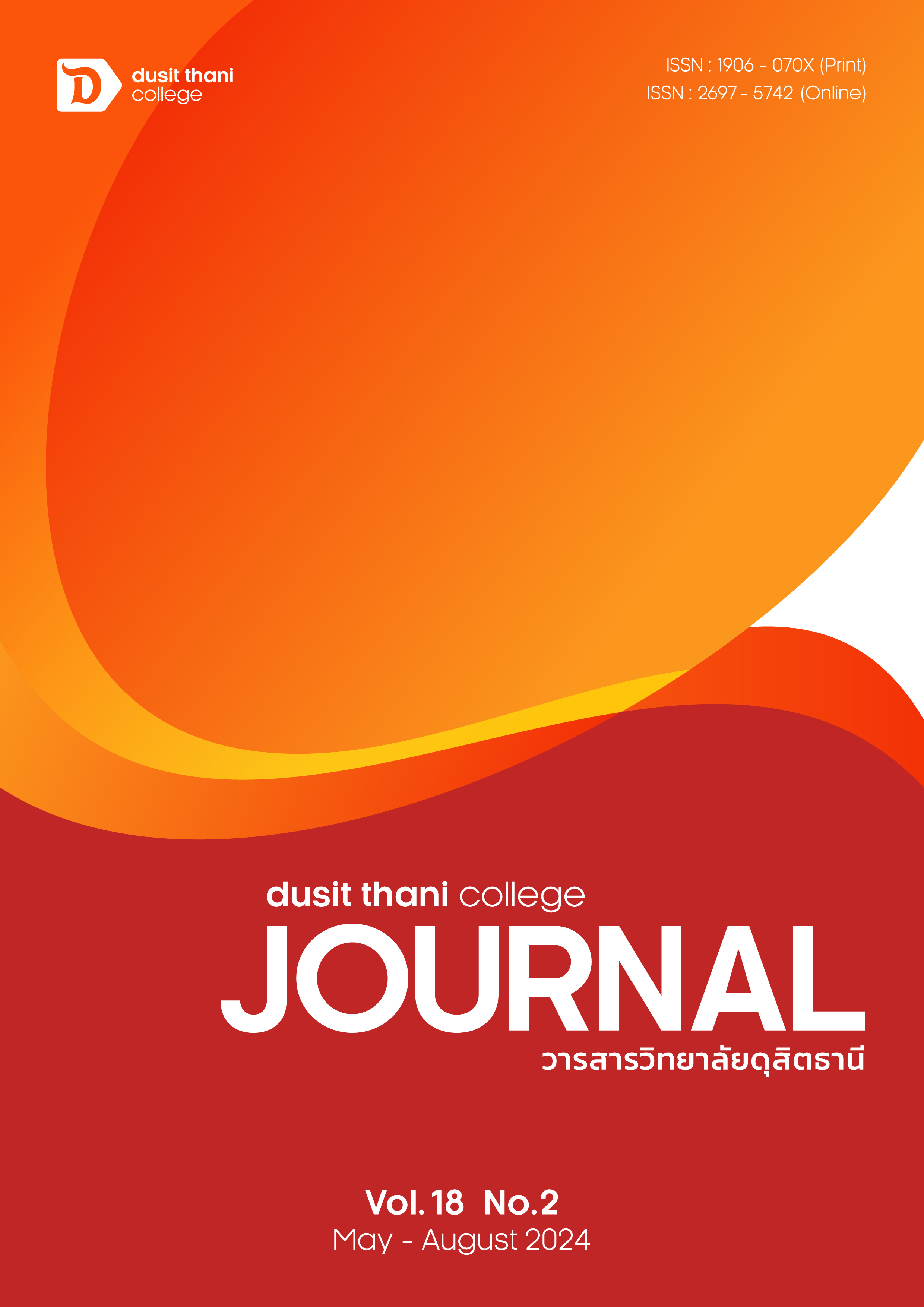ความสัมพันธ์ระหว่างกลุ่มอ้างอิงและสิ่งเร้าทางการตลาด กับแรงจูงใจในการซื้ออาหาร เดลิเวอรีของผู้บริโภคคนเมืองในกรุงเทพมหานครและปริมณฑล
Main Article Content
บทคัดย่อ
การศึกษานี้มีวัตถุประสงค์เพื่อ 1) ศึกษาความสัมพันธ์ระหว่างกลุ่มอ้างอิงและสิ่งเร้าทางการตลาด กับแรงจูงใจในการซื้ออาหารเดลิเวอรีของผู้บริโภคคนเมือง และ 2) ค้นหาข้อมูลเชิงลึกเกี่ยวกับแรงจูงใจในการซื้ออาหารเดลิเวอรี ใช้ระเบียบวิธีวิจัยแบบผสมวิธี โดยการวิจัยเชิงปริมาณ กลุ่มตัวอย่างคือผู้บริโภคในกรุงเทพมหานครและปริมณฑล 440 คน ได้มาด้วยการสุ่มตัวอย่างแบบชั้นภูมิ วิเคราะห์ข้อมูลด้วยความถี่ ร้อยละ ค่าเฉลี่ย ส่วนเบี่ยงเบนมาตรฐาน และสัมประสิทธิ์สหสัมพันธ์แบบเพียร์สัน และใช้การวิจัยเชิงคุณภาพเพื่อค้นหาข้อมูลเชิงลึกเกี่ยวกับแรงจูงใจในการซื้ออาหารเดลิเวอรี โดยสัมภาษณ์เชิงลึกผู้บริโภค 10 คน แล้วทำการวิเคราะห์เนื้อหา
ผลการวิจัยพบว่า กลุ่มอ้างอิงและสิ่งเร้าทางการตลาด มีความสัมพันธ์เชิงบวกกับแรงจูงใจในการซื้ออาหารเดลิเวอรี อย่างมีนัยสำคัญที่ระดับ .01 นักการตลาดสามารถใช้ประโยชน์จากกลุ่มอ้างอิง โดยเฉพาะกลุ่มเพื่อนและครอบครัวเพื่อสร้างความไว้วางใจและกระตุ้นความสนใจในสินค้าและบริการ และยังสามารถใช้สิ่งเร้าทางการตลาดคือ สินค้าที่หลากหลาย บรรจุภัณฑ์ที่มีมาตรฐาน รูปภาพสินค้าประกอบ ปริมาณไรเดอร์ที่เพียงพอ และการกำหนดอัตราค่าส่งที่เป็นธรรมหรือต่ำกว่าคู่แข่งขัน การนำเสนอประโยชน์ของช่องทางออนไลน์ที่สะดวก รวดเร็ว ลดการเผชิญปัญหาการจราจร รวมถึงใช้การสื่อสารทางการตลาดทั้งการส่งเสริมการขาย การลดราคา การสื่อสารผ่านการรีวิวหรือการโฆษณาผ่านเครือข่ายสังคมออนไลน์ นอกจากนี้ผลวิจัยให้เห็นว่าผู้บริโภคคำนึงถึงการดำเนินธุรกิจตามหลักธรรมาภิบาล ดังนั้นธุรกิจควรปฏิบัติอย่างซื่อสัตย์และมีความรับผิดชอบ สร้างภาพลักษณ์เชิงบวก ซึ่งจะนำมาสู่ความน่าเชื่อถือและได้รับการสนับสนุนธุรกิจในระยะยาว
Article Details

อนุญาตภายใต้เงื่อนไข Creative Commons Attribution-NonCommercial-NoDerivatives 4.0 International License.
นโยบายการพิจารณากลั่นกรองบทความ
- บทความวิจัยและบทความวิชาการทุกเรื่องที่จะได้รับการตีพิมพ์ต้องผ่านการพิจารณากลั่นกรองโดยผู้ทรงคุณวุฒิ (Peer Review) ในสาขาที่เกี่ยวข้อง จำนวน 3 ท่าน/บทความ
- บทความ ข้อความ ภาพประกอบและตารางประกอบที่ลงตีพิมพ์ในวารสารเป็นความคิดเห็นส่วนตัวของผู้เขียน กองบรรณาธิการไม่จำเป็นต้องเห็นด้วยเสมอไป และไม่มีส่วนรับผิดชอบใด ๆ ถือเป็นความรับผิดชอบของผู้เขียนแต่เพียงผู้เดียว
- บทความที่จะได้รับการตีพิมพ์จะต้องไม่เคยตีพิมพ์ เผยแพร่ที่ใดมาก่อน และไม่อยู่ระหว่างการพิจารณาของวารสารฉบับอื่น หากตรวจสอบพบว่ามีการตีพิมพ์ซ้ำซ้อน ถือเป็นความรับผิดชอบของผู้เขียนแต่เพียงผู้เดียว
- บทความใดที่ผู้อ่านเห็นว่าได้มีการลอกเลียนหรือแอบอ้างโดยปราศจากการอ้างอิง หรือทำให้เข้าใจผิดว่าเป็นผลงานของผู้เขียน กรุณาแจ้งให้กองบรรณาธิการวารสารทราบจะเป็นพระคุณยิ่ง
เอกสารอ้างอิง
Aji, N. S., Djawahir, A. H., & Rofiq, A. (2019). The influence of products and promotions on purchasing decisions mediated in purchase motivation. Journal of Applied Management, 17(1), 152-161.
Agmapisarn, C., Khetjenkarn, S., Tachochalalai, S. (2020). A study of Bangkok Street food consumption and its effects on consumer attitude and behavioral intention. Chulalongkorn Business Review, 42(1), 21-42.
Blackwell, R., DSouza, C., Taghian, M., Miniard, P., & Engel, J. (2006). Consumer behaviour: an Asia Pacific approach. South Melbourne, AUS: Thomson.
Bodhisundara, N., & Pattanarangsun, P. (2022). The Factors Affecting the Decision to Use Food Delivery Applications in Bangkok. Journal of Business, Economics and Communications, 17(4), 123-139.
Boonchuai, P. & Chantuk, T. (2019). The causal relationship of the interest which influences the decision to shop online of generation Y. University of the Thai Chamber of Commerce Journal, 39(1), 22-36.
Boonmarueang, W., Kumpal, P., & Jungsuwadee, K. (2022). The factors influencing the working-age consumers’ decision to buy online goods in Ubon Ratchathani province. Journal of MCU Ubon Review, 7(2), 235-248.
Brown, L. D., & Caylor, M. L. (2006). Corporate governance and firm valuation. Journal of Accounting and Public Policy, 25(4), 409-434.
Digital Government Development Agency. (2023). Population report classified by province and age for the fiscal year 2022. Retrieved from https://data.go.th/dataset/dataset-rg_11_14
Jitsoonthornchaikul, M. (2022). The causal relationship in influencing buying behavior of online food delivery in the Bangkok area. Humanities, Arts and Social Sciences Studies, 22(2), 413-422.
Kasikorn Research Center. (2022). Amidst the ongoing COVID-19 pandemic and measures implemented to control the outbreak, it is anticipated that the food delivery market's value will increase by 18.4-24.4 percent throughout the entirety of the year 2021. Retrieved December 22, 2023, from https://www.kasikornresearch.com/InfoGraphic/Documents/z3256.pdf
Kasikorn Research Center. (2024). The Food Delivery market in 2024 continues to exhibit a downward trend. Retrieved from https://medias.thansettakij.com/media/pdf/2024/0uxrX51Ih8CEor3rnXhq.pdf
Kotler, P., & Armstrong, G. (2012). Principles of marketing. 14th ed. New Jersey: Pearson Prentice Hall.
Krejcie, R. V., & Morgan, D. W. (1970). Determining sample size for research activities. Educational and Psychological Measurement, 30(3), 607-610.
Loudon, D. L., & Della Bitta, A. J. (1984). Consumer behavior: Concepts and applications. New York: McGraw-Hill.
Mehrolia, S., Alagarsamy, S., & Solaikutty, V. M. (2021). Customers response to online food delivery services during COVID‐19 outbreak using binary logistic regression. International Journal of Consumer Studies, 45(3), 396-408.
Nunnally, J. (1978). Psychometric Theory. New York, NY: McGraw-Hill.
Panyana, N. & Sapsanguanboon, W. (2019). Factors affecting the decision making in Thai food cooked to order and delivery. Economics and Business Administration Journal Thaksin University, 11(1), 53-66.
Poldongnok, T. (2021). Digital integrated marketing communication and reliability of application relating to consumer's buying behavior on application Shopee of generation Y in Rayong province. (Master of Business Administration). Srinakharinwirot University.
Ramya, N. A. S. A. M., & Ali, S. M. (2016). Factors affecting consumer buying behavior. International Journal of Applied Research, 2(10), 76-80.
Smith, K. T. (2011). Digital marketing strategies that Millennials find appealing, motivating, or just annoying. Journal of Strategic Marketing, 19(6), 489-499.
Trade Competition Commission of Thailand. (2020). Explore competitive behaviors in the business sector by offering food delivery services. Retrieved from https://www.caat.or.th/
wpcontent/uploads/2020/11/ฉ.60-จุลสารมองโลกแข่งขัน.pdf
Uppathampracha, R. (2015). The relationship between good governance and performance of Thai listed companies in the stock exchange of Thailand. Srinakharinwirot Business Journal, 6(1), 12-25.
Zhang, S., Liu, L., & Feng, Y. (2019). A study of factors influencing restaurants sales in online-to-offline food delivery platforms: differences between high-sales restaurants and low-sales restaurants. Pacific Asia Conference on Information Systems 2019, China.


